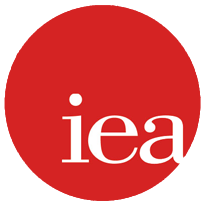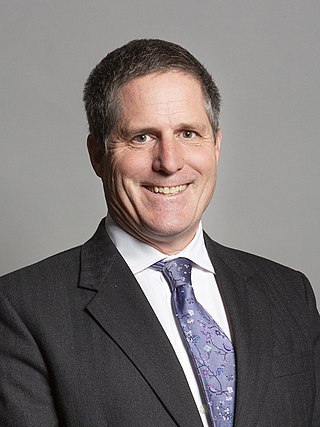
The International Institute for Strategic Studies (IISS) is a British research institute or think tank in the area of international affairs. Since 1997, its headquarters have been at Arundel House in London.

Theresa Mary, Lady May is a British politician who served as Prime Minister of the United Kingdom and Leader of the Conservative Party from 2016 to 2019. She previously served in David Cameron's cabinet as Home Secretary from 2010 to 2016, and has been Member of Parliament (MP) for Maidenhead in Berkshire since 1997. May was the UK's second female prime minister after Margaret Thatcher, and the first woman to hold two of the Great Offices of State. Ideologically, May identifies herself as a one-nation conservative.

The Institute for Public Policy Research (IPPR) is a progressive think tank based in London. It was founded in 1988 by Lord Hollick and Lord Eatwell, and is an independent registered charity. The think tank aims to maintain the momentum of progressive thought in the United Kingdom through well-researched and clearly argued policy analysis, reports, and publications; as well as a high media profile.

The Centre for Policy Studies (CPS) is a think tank and pressure group in the United Kingdom. Its goal is to promote coherent and practical policies based on its founding principles of: free markets, "small state," low tax, national independence, self determination and responsibility. While being independent, the centre has historical links to the Conservative Party.

The Institute of Economic Affairs (IEA) is a right-wing, free market think tank registered as a UK charity. Associated with the New Right, the IEA describes itself as an "educational research institute" and says that it seeks to "further the dissemination of free-market thinking" by "analysing and expounding the role of markets in solving economic and social problems". The IEA was established to promote free-market solutions to economic challenges by targeting influential academics and journalists, as well as students, in order to propagate these ideas widely. Adopting as its credo FA Hayek's view that "yesterday's dissent becomes today's consensus," the IEA says that it prioritises producing work with a focus on economic insights over partisan politics.

A zero-emission vehicle, or ZEV, is a vehicle that does not emit exhaust gas or other pollutants from the onboard source of power. The California definition also adds that this includes under any and all possible operational modes and conditions. This is because under cold-start conditions for example, internal combustion engines tend to produce the maximum amount of pollutants. In a number of countries and states, transport is cited as the main source of greenhouse gases (GHG) and other pollutants. The desire to reduce this is thus politically strong.

Atlas Network, formerly known as the Atlas Economic Research Foundation, is a non-governmental 501(c)(3) organization based in the United States that provides training, networking and grants for libertarian, free-market, and conservative groups around the world.
Stephen Pollard is a British author and journalist. From 2008 until December 2021, he was the editor of The Jewish Chronicle and remains a senior advisor and writer on the paper.

The availability and uptake of green electricity in the United Kingdom has increased in the 21st century. There are a number of suppliers offering green electricity in the United Kingdom. In theory these types of tariffs help to lower carbon dioxide emissions by increasing consumer demand for green electricity and encouraging more renewable energy plant to be built. Since Ofgem's 2014 regulations there are now set criteria defining what can be classified as a green source product. As well as holding sufficient guarantee of origin certificates to cover the electricity sold to consumers, suppliers are also required to show additionality by contributing to wider environmental and low carbon funds.

Anthony Howe Browne is a British politician who has served as the Member of Parliament (MP) for South Cambridgeshire since the 2019 general election. He is a member of the Conservative Party.
Mandatory renewable energy targets are part of government legislated schemes which require electricity merchandisers to source-specific amounts of aggregate electricity sales from renewable energy sources according to a fixed time frame. The objective of these schemes is to promote renewable energy and decrease dependency on fossil fuels. If this results in an additional expenditure of electricity, the additional cost is distributed across most customers by increases in other tariffs. The cost of this measure is therefore not funded by the government budgets, except for costs of establishing and monitoring the scheme and any audit and enforcement actions. As the cost of renewable energy has become cheaper than other sources, meeting and exceeding a renewable energy target will also reduce the expenditure of electricity to consumers.
The Legatum Institute is a think tank based in London, UK. Its stated aim is to advance the education of the public in national and international political, social and economic policy. The Institute has over forty donors including the Legatum Foundation. It has been called "arguably the most influential think tank in Britain pushing its free market pro-Brexit vision and enjoying privileged access to media and ministers" but it has attracted controversy as a result of its opaque, offshore funding.

Climate change is impacting the environment and human population of the United Kingdom (UK). The country's climate is becoming warmer, with drier summers and wetter winters. The frequency and intensity of storms, floods, droughts and heatwaves is increasing, and sea level rise is impacting coastal areas. The UK is also a contributor to climate change, having emitted more greenhouse gas per person than the world average. Climate change is having economic impacts on the UK and presents risks to human health and ecosystems.

ResPublica is a British independent public policy think tank, founded in 2009, by Phillip Blond. It describes itself as a multi-disciplinary, non-party political research organisation, whose aim is the creation of bold solutions for enduring socioeconomic problems.

An energy transition is a significant structural change in an energy system regarding supply and consumption. Currently, a transition to sustainable energy is underway to limit climate change. It is also called renewable energy transition. The current transition is driven by a recognition that global greenhouse-gas emissions must be drastically reduced. This process involves phasing-down fossil fuels and re-developing whole systems to operate on low carbon electricity. A previous energy transition took place during the industrial revolution and involved an energy transition from wood and other biomass to coal, followed by oil and most recently natural gas.

Renewables supply a quarter of energy in Turkey, including heat and electricity. Some houses have rooftop solar water heating, and hot water from underground warms many spas and greenhouses. In parts of the west hot rocks are shallow enough to generate electricity as well as heat. Wind turbines, also mainly near western cities and industry, generate a tenth of Turkey’s electricity. Hydropower, mostly from dams in the east, is the only modern renewable energy which is fully exploited. Hydropower averages about a fifth of the country's electricity, but much less in drought years. Apart from wind and hydro, other renewables; such as geothermal, solar and biogas; together generated almost a tenth of Turkey’s electricity in 2022. Türkiye has ranked 5th in Europe and 12th in the world in terms of installed capacity in renewable energy. The share of renewables in Türkiye’s installed power reached to 54% at the end of 2022.
Dominic Mckenzie Cummings is a British political strategist who served as Chief Adviser to British Prime Minister Boris Johnson from 24 July 2019 until Cummings resigned on 13 November 2020.

Extinction Rebellion is a UK-founded global environmental movement, with the stated aim of using nonviolent civil disobedience to compel government action to avoid tipping points in the climate system, biodiversity loss, and the risk of social and ecological collapse. Extinction Rebellion was established in Stroud in May 2018 by Gail Bradbrook, Simon Bramwell, and Roger Hallam, along with eight other co-founders from the campaign group Rising Up!

55 Tufton Street is a four-storey Georgian-era townhouse on historic Tufton Street, in Westminster, London, owned by businessman Richard Smith. Since the 2010s the building has hosted a network of libertarian lobby groups and think tanks related to pro-Brexit, climate science denial and other fossil-fuel lobby groups. Some of the organisations it houses have close connections with those at 57 Tufton Street next door, including the Centre for Policy Studies and CapX.
Green recovery packages are proposed environmental, regulatory, and fiscal reforms to rebuild prosperity in the wake of an economic crisis, such as the COVID-19 pandemic or the Global Financial Crisis (GFC). They pertain to fiscal measures that intend to recover economic growth while also positively benefitting the environment, including measures for renewable energy, efficient energy use, nature-based solutions, sustainable transport, green innovation and green jobs, amongst others.














